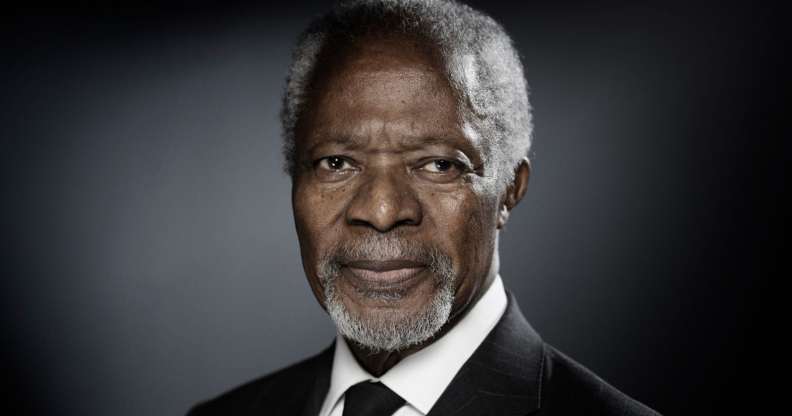Kofi Annan dead: How the ex-UN secretary general stood up for protection of gay people

Former United Nations (UN) secretary-general Kofi Annan poses during a photo session in Paris on December 11, 2017. (Photo by JOEL SAGET / AFP) (Photo credit should read JOEL SAGET/AFP/Getty Images)
Ghanaian diplomat Kofi Annan, who was secretary-general of the United Nations (UN) from 1997 to 2006, has died aged 80 on Saturday (August 18), his family and foundation has said.
Annan, who repeatedly spoke out against the discrimination of gay people, died following a “short illness,” a statement posted on Annan’s official Twitter account read.
The Annan family and the Kofi Annan Foundation described the seventh secretary-general, who received jointly received the Nobel Peace Prize with the UN for his humanitarian work in 2001, as a “global statesman and deeply committed internationalist who fought throughout his life for a fairer and more peaceful world.”
“Wherever there was suffering or need, he reached out and touched many people with his deep compassion and empathy. He selflessly placed others first, radiating genuine kindness, warmth and brilliance in all he did,” the statement continued.
It is with immense sadness that the Annan family and the Kofi Annan Foundation announce that Kofi Annan, former Secretary General of the United Nations and Nobel Peace Laureate, passed away peacefully on Saturday 18th August after a short illness… pic.twitter.com/42nGOxmcPZ
— Kofi Annan (@KofiAnnan) August 18, 2018
Annan, who was born in Kumasi, Ghana, on 8 April 1938, reportedly died in a hospital in Switzerland, where he had been living for the past few years.
The diplomat, who went on to be the UN’s special envoy for Syria, condemned the discrimination of gay people during his tenure as the UN secretary-general, which coincided with the HIV/Aids pandemic.
In 2006, while he was secretary-general, Annan called for gay men to be recognised in the fight to end HIV/AIDS.
“We need to be realistic,” he said at the time. “We will not succeed by putting our heads in the sand and pretending these people do not exist or do not need help.”
“We must work closely and constructively with those who have so often been marginalized, sex workers, injecting drug users and men who have sex with men.”
Back in 2003, Annan, who was the first black African person to get the role as secretary-general, took part in an event at the UN Headquarters in New York, which was focused on protecting the rights of lesbians and gays around the world.
At the event, Annan made an impromptu speech calling for an end to the discrimination of gay people.
“We should be much more tolerant and compassionate. And I think what is important is that we should stress those positive aspects in our society, the things that bring us together, and move away from discrimination and persecution,” he said.
He added: “And we also heard your message about rights, and we have rules here that we are looking at that affect some of these things. So, welcome to the UN.”
In a statement following the event, UN spokesperson Fred Eckhard said that Annan “believes that the United Nations cannot condone any persecution of, or discrimination against, people on any grounds, and recalls Article 2 of the Universal Declaration of Human Rights, which says that ‘Everyone is entitled to all the rights and freedoms set forth in this Declaration, without distinction of any kind.'”
The spokesperson suggested that Annan supported equal marriage, adding: “On the issue of same sex marriage, [Annan’s] personal view, as stated in last week’s press conference, is ‘that individuals should be allowed to make their own choices and that we should be careful not to draw conclusions, or adopt prejudicial attitudes, towards people for their choices and preferences.'”

Ex-UN secretary-general Kofi Annan, who passed away on Saturday, in Berlin, Germany, in September 2016. (Sean Gallup/Getty Images)
But, the spokesperson said, Annan did not believe that the UN should actively campaign for gay marriage.
Eckhard continued: “Annan recognizes that there is a wide range of opinion on the issue among Member States, with very strong feelings on both sides of the argument, and he does not believe this is something the United Nations should get involved in.”
Annan succeeded Boutros Boutros-Ghali as leader of the UN in 1997, having first started working for the UN in 1962 as an administrative officer with the World Health Organization in Geneva.
Before taking up his role as secretary-general, he worked for the Economic Commission for Africa in Addis Ababa; the UN Emergency Force in Ismailia; and the UN high commissioner for refugees in Geneva.
He also served in several senior roles at the UN’s headquarters in New York, including as the under-decretary-general for peacekeeping from March 1992 to December 1996.

Annan died following a “short illness” his foundation said in a statement. (Adam Berry/Getty Images)
The Ghanaian continued to champion the protection of gay people after his tenure as the world’s top diplomat had ended. He was succeeded by South Korean politician Ban Ki-moon.
In 2010, the Guardian reported an instance in which Annan criticised the imprisonment of gay Malawian couple Tiwonge Chimbalanga and Steven Monjeza as “very regressive.”
Annan founded the Kofi Annan Foundation, which focuses on international development, in 2007.
In 2016, he was chosen to lead a UN commission to investigate the Rohingya crisis.

